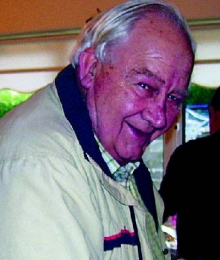Michael Auret, who for more than 20 years fought for justice in Zimbabwe, is now peacefully retired in Co Offaly. Viktor Posudnevsky speaks to the man regarded as an icon by Zimbabweans the world over
Seventy-two-year-old Michael Auret enjoys rural life in Ireland, and the climate does not bother him. “I prefer cold to hot,” says the Zimbabwe native, who lives in the small village of Cloghan in Co Offaly with his Irish wife, their two children and five grandchildren.
His days are serene and are spent mostly around the family garden, and writing. He has recently finished a book touching on his past life in Zimbabwe – a life miles apart from this peaceful retirement.
It was a heart problem that prompted Auret to leave his homeland. “It was all the pressure and the tension and the stress of being in parliament in Zimbabwe,” he says. “Listening to the most dreadful lies and knowing that you’re sitting there with people who are at the very least accessories to murder. Day after day, it becomes a bit much.”
For almost 30 years Auret opposed Zimbabwe’s governments, campaigning for justice and equality. He first took a stand in the 1970s against the white minority rule led by Ian Smith. But after Zimbabwe gained full independence and Mugabe grabbed power, Auret became increasingly disillusioned.
Working for the Catholic Justice and Peace Commission, he opposed the regime without fear, by speaking about the mass killings Mugabe’s Zanu-PF party committed in Matabeleland, the southern province of Zimbabwe, and engaging in political activism.
Auret was allied with Morgan Tsvangirai’s Move-ment for Democratic Change (MDC) from day one, and in 2000 he contested parliamentary elections, winning a seat in Harare Central. But the stress and the tension were getting too much for the veteran campaigner Auret.
“It was as unjust an election as any in Zimbabwe,” he says, referring to his 2000 campaign. “Two of the people working with our campaign were murdered. Beatings were commonplace and the war veterans [loyal to Mugabe] were creating all sorts of violence.”
Though he had a seat in parliament, it was a realisation of the futility of his position that made Auret an exile in 2001.
“It was clear to me from sitting in parliament for a year that Zanu-PF was simply not going to relinquish power,” he says. “It was impossible to change.”
Auret first went to Cape Town in neighbouring South Africa, where his heart condition significantly improved away from the troubles of Zimbabwe, and then moved to Ireland for retirement.
He subsequently resigned from the MDC. But despite giving up the day-to-day fight, Auret is confident that Zimbabwe will see better days.
“There are tremendously good people in Zimbabwe,” he says. “They cannot fight the regime because they are physically weakened by famine and disease… but those who survive will come through and the country will regain itself.”
Zimbabweans in Ireland and abroad remember Auret for his activism and hold the man in high esteem. Johannes Nya-wata, chairman of the Zim-babwean Community Network Ireland, refers to him as an “icon”.
“I am excited that a man like him is here,” said Nyawata, who first contacted Auret via Metro Éireann. “He guarded human rights jealously and opposed any kind of discrimination…We would be delighted to invite him as a guest of honour to our celebrations of Zimbabwe’s independence day this year.”
He also said Auret could provide insights and ideas as to how Zimbabweans abroad could help rebuild their home country. “He is invaluable to us.”
Michael Auret’s book on Robert Mugabe, From Liber-ator to Dictator, is due to be published in March by New Africa Books.
viktor@metroeireann.com












